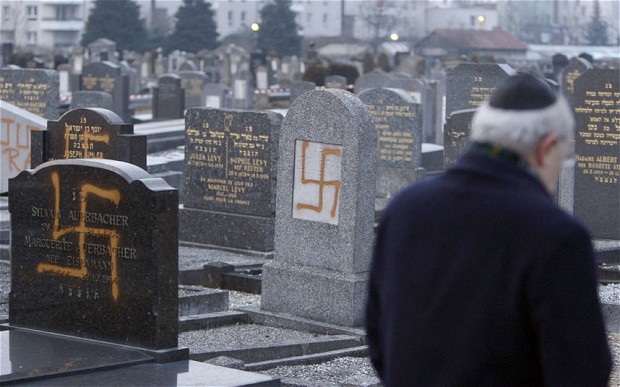Once again European anti-Semitism is rearing its ugly head. In this analysis, the author calls for zero tolerance for Jew-hatred but notes a sharp rise in immigration to Israel as a result of the growing trend.
It doesn’t take a great political analyst to recognize a reality of greater concern with each passing day for European leaders, not to mention Jewish communities across Europe: growing anti-Semitism.
Two weeks ago we reported that the Jewish community of the city of Odessa was preparing for an exodus to Israel should the rate of violence continue to increase in the region. Additionally, during these tense days in which threats of violence continue to loom over Jews in the region, it has been reported that immigration from the Ukraine to Israel has increased by 142 percent since the beginning of the last year.
Last week, after the victory of Israel’s Maccabi basketball team against Real Madrid in the Final Four, several hundred radical Spanish nationals posted on social networks thousands of messages containing strong anti-Semitic content. Few political leaders condemned these offenses, and despite Jewish protests to the courts in Spain, the general public still remains unaware.
ADL: European Anti-Semitism most Widespread in Greece and France
The Anti-Defamation League, a Jewish organization based in the U.S. which aims to combat the dissemination of anti-Semitic propaganda and hatred of Jews worldwide, conducted 53,100 interviews in over 100 countries. Based on the results of this study, the ADL concluded that anti-Semitism is “persistent” and “generalized” worldwide, placing Spain behind Greece and France – the latter being the country in which, according to El Pais, many people harbor misconceptions and prejudice thoughts about Jews.
Esteban Ibarra, a renowned Spanish analyst and president of the Movement Against Intolerance, believes that in Spain there has been, above all, a significant increase in neo-Nazi anti-Semitism on the internet, citing five-fold increases in the past four years in a number of web pages, blogs, forums and other anti-Semitic or racist material. Indeed, the World Wide Web includes hundreds of these websites.
Just last Saturday a horrific attack was carried out at the Jewish Museum in Brussels, killing four people, two of whom were volunteers at the museum and two Israelis on vacation. Such an attack is certainly reminiscent of that which took place in Toulouse two years ago.
The tragedy in Brussels was reported. However, an attack on two Jewish boys that took place shortly afterwards in neighboring France apparently was not considered serious enough to receive much media coverage. Making their way home from a Paris synagogue, the Jewish brothers were viciously beaten with iron bars.
Although they represent only one percent of the French population, Jews in the Gallic country are the subject of 40 percent of hate crimes. The SPCJ (Protection Service of the Jewish Community) recorded 423 anti-Semitic acts, 318 threats, 49 acts of violence, 52 cases of vandalism including arson attacks and three attempts at murder last year. Perhaps this explains the fact that for the first time in history, more French Jews emigrated to Israel last year than did American Jews. Moreover, Israel expects to receive a continuing flow of French immigrants in the coming years.
Support for Neo-Nazi Parties Shows Prevalence of European Anti-Semitism
The incidents in Brussels and Paris took place within 24 hours of each other and mere hours after the conclusion of the European elections. The attackers succeeded in sending a clear message to the world: Jews may never feel fully secure wherever they are in Europe. Their message has been received.
But now we must wait for European leaders, who this time condemned the attacks, to convert their words and condolences to the families of the deceased into actual policies in education aimed at preventing further attacks. Defenseless Jewish communities require more support from their leaders and protection.
Current legislation lacks specific measures designed to eliminate anti-Semitism. It lacks the prospect of severe consequences to those who promote anti-Semitism, while the European Union fails to distinguish between specific violent acts of anti-Semitism and regular cases of criminal behavior. Such differentiation is long overdue. The number of people that expressed their support for neo-Nazi political parties in the European elections is perhaps the clearest demonstration of the failure of the educational system. More importantly, it raises serious questions and challenges about how to confront and actively deal with this increasingly threatening problem. We can no longer stand back and rely on the laws and system of education, which seem to be rapidly cracking under the pressures of radicalism.
In the words of World Jewish Congress President Moshe Kantor, “the fact that a quarter of Jews are not able to express their Jewishness out of fear must be a historic moment for the continent of Europe and the European Union.”
Zero tolerance for racism and hate remains the ideal. Meanwhile, European anti-Semitism has convinced many Jews to make aliyah.
United with Israel
